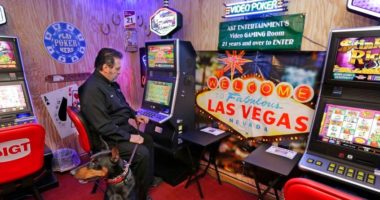Several Towns Rushed To Approve Video Gaming “Push Tax” Before Legislative Deadline


The Illinois Senate and House passed HB 3136 last week, a bill enabling municipalities to levy a “push tax” on video gaming terminals (VGTs).
In order to implement the force tax in the future, towns had to do so before Monday. As a result, on Sunday, the community board and city authorities of Calumet City, Dolton, Markham, South Chicago Heights, and University Park all complied with the condition.
In this scenario, players at VGT are subjected to a force tax, where they are charged a cent for each online game they play.
Oak Lawn implemented the push tax in 2020 as a means to increase revenue. In response, the VGT sector promptly took legal action against the city. Waukegan is considering following suit with a similar strategy.
The background of Illinois’ force tax
Oak Lawn introduced the push tax in response to feeling unsatisfied with the lack of a fair share of VGT revenue.
The state’s VGT revenue saw a rise from 25% to 29% in 2019 as a result of new gaming legislation. Despite this increase, municipalities continue to receive a consistent 5% share of the revenue.
Paul Mallot, a trustee in Oak Lawn, informed The Patch Oak Lawn:
The video game industry’s decision to ignore local governments in the redistribution of revenue-sharing funds was deemed scandalous. The industry generates billions of dollars in income, and cities rely on this revenue to fund essential services such as police, emergency services, and street maintenance. These services are vital for creating a safe and welcoming environment for businesses to operate effectively.
Mallo continued:
After speaking with multiple Oak Lawn bettors and conducting our own research, we discovered that they typically placed anywhere between 100 and 200 bets per session. As a result, both the bettors and ourselves agreed that the $1 or $2 tax was not perceived as unfair.
Recently, the Illinois Gaming Machine Operators Association accused the squeeze revenue of being illegal. Critics argue that tracking each play is difficult and that it imposes a tax on the casino, potentially discouraging them from continuing to play.
This has the potential to negatively impact the operators. For instance, Homer Glen rejected the tax proposal. Mayor George Yukich of Homer Glen was quoted in the Chicago Tribune as saying that the push tax would harm local businesses.
During a presentation to the village board, Mike Pappas, an executive at Accel Entertainment, warned that implementing a push tax could potentially lead to gamblers seeking alternative destinations without such taxes, even for as little as one cent.
The drive duty has proven to be a boon for Oak Lawn, resulting in an anticipated annual revenue increase of $1 million.
Illinois receives sizable revenue earnings from VGTs.
The main reason for the disagreement is the large amount of money made from VGTs. Implementing a 1% tax in the future could result in substantial profits.
The state is facing a significant 29% reduction in funding. Furthermore, in September, Video Gaming Terminals (VGTs) generated $61.3 million in tax revenue for Illinois.
To provide context, the amount is just shy of $10 million less than the total earnings the state has generated from sports betting since its inception.
What more did HB 3136 contain?
HB 3136, a bill that proposes important changes for the gaming industry in Illinois, holds great significance.
In addition to the push tax, there have been several notable changes in sports betting.
The bill includes a clear end date for in-person sports betting membership, which is considered its most important aspect. Although it could end before then, the specified termination date is March 5, 2022.
The bill now allows betting on Illinois college teams, a change from previous restrictions. However, residents must bet in person at a physical sportsbook, as online betting is still not permitted. Live bets are also prohibited.
Additionally, Wintrust Arena would be permitted to seek financial sports betting registration under the bill, which is awaiting approval from Illinois Governor JB Pritzker.






